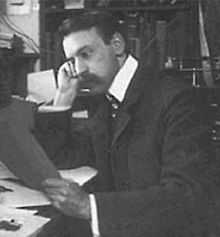Arthur Eichengrün

Arthur Eichengrün (August 13, 1867 – December 23, 1949) was a German Jewish chemist, best known through a controversy about who invented aspirin.
Life
Arthur Eichengrün was born in Aachen as the son of a Jewish cloth merchant and manufacturer. In 1885, he took up studies in chemistry at the University of Aachen, later moved to Berlin, and finally to Erlangen, where he received a doctoral degree in 1890.
In 1896, he joined Bayer, working in the pharmaceutical laboratory. In 1908, he quit Bayer and founded his own pharmaceutical factory, the Cellon-Werke in Berlin. His company was "Aryanized" by the Nazis in 1938.
In 1943, he was arrested and sentenced to four months in prison for having failed to include the word "Israel" in his company's name. In May 1944, he was arrested again on the same charge and deported to the concentration camp Theresienstadt, where he spent 14 months until the end of World War II in Europe, miraculously escaping death.
After the liberation, he returned to Berlin, but moved to Bad Wiessee in Bavaria in 1948, where he died the following year at the age of 82.
Work
Aspirin
Eichengrün has made his name through numerous inventions, such as processes for synthesizing chemical compounds. He held 47 patents. Arguably, however, he is best known through the controversy around the question who invented aspirin.
The standard story credits Felix Hoffmann, a young Bayer chemist, with the invention of aspirin in 1897. Impure acetylsalicylic acid (ASA, the active compound of aspirin) had been synthesized already in 1853 by French chemist Charles Frédéric Gerhardt; the 1897 process developed at Bayer was the first to produce pure ASA that could be used for medical purposes.
In 1949, Arthur Eichengrün published a paper in which he claimed to have planned and directed the synthesis of aspirin along with the synthesis of several related compounds. He also claimed to be responsible for aspirin's initial surreptitious clinical testing. Finally, he claimed that Hoffmann's role was restricted to the initial lab synthesis using his (Eichengrün's) process and nothing more.[1]
The Eichengrün version was ignored by historians and chemists until 1999, when Walter Sneader of the Department of Pharmaceutical Sciences at the University of Strathclyde in Glasgow re-examined the case and came to the conclusion that indeed Eichengrün's account was convincing and correct and that Eichengrün deserved credit for the invention of aspirin.[2] Bayer denied this speculation in a press release, confirming that the invention of aspirin was due to Hoffmann.
Protargol
In 1897, protargol, a silver salt of a protein mixture, developed by Eichengrün at Bayer, was introduced as a new drug against gonorrhea. Protargol stayed in use until sulfa drugs and then antibiotics became available in the 1940s.[3]
References
- ↑ Eichengrün A. 50 Jahre Aspirin. Pharmazie 1949;4:582-4. (in German)
- ↑ Sneader, W (2000). "The discovery of aspirin: a reappraisal". BMJ (Clinical research ed.) 321 (7276): 1591–4. doi:10.1136/bmj.321.7276.1591. PMC 1119266. PMID 11124191.
- ↑ Vaupel, E (2005). "Arthur Eichengrün--tribute to a forgotten chemist, entrepreneur, and German Jew". Angewandte Chemie (International ed. in English) 44 (22): 3344–55. doi:10.1002/anie.200462959. PMID 15798983.
External links
- Sneader's paper in the British Medical Journal.
- Responses to Sneader's paper in the British Medical Journal.
- Bayer's press release at the Wayback Machine (archived September 28, 2007) (in German).
|